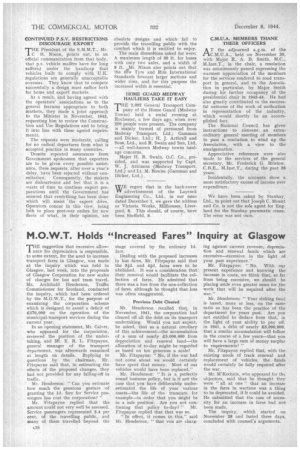M.O.W.T. Holds "Increased Fares" Inquiry at Glasgow
Page 20

If you've noticed an error in this article please click here to report it so we can fix it.
'THE suggestion that excessive allow' ance for depreciation is responsible, to soine extent, for the need to increase transport fares in Glasgow, was made at the inquiry which was held in Glasgow, last week, into the proposals of Glasgow Corporation for new scales of charges for bus and tram travel. Mr, Archibald Henderson, Traffic Commissioner for Scotland, conducted the inquiry, which had been ordered by the M.0,W.T., for the purpose of examining the corporation scheme which is designed to avoid a deficit of £576,000 on the operation of the municipal-transport services during the current year.
In an opening statement, Mr. Calver, who appeared for the corporation, reviewed the position of the undertaking, and Mt. E. R. L. Fitzpayne, general manager of the transport department, was afterwards examined at length on details. Replying to questions by the chairman, Mr. Fitzpayne said that, in estimating the effects of the proposed changes, they had not provided for any falling-off in traffic.
' Mr. Henderson: "Can you estimate how much the generous gesture -of granting the id. fare for Service passengers has cost the corporation? "
Mr. Fitzpayne replied that the amount could not very well be assessed. Service passengers represented 3.4 per cent. of the travelling public, and many of them travelled beyond the stage covered by the ordinary Id. fare.
Dealing with the proposed increases in bus fares, Mr. Fitzpayne said that the 3icl, and 40. fares were to be abolished. It was a consideration that their removal would facilitate the collection of fares. He admitted that there was a loss from the non-collection of fares, although he thought that loss was often exaggerated,
Previous Debt Cleated
Mr. Henderson recalled that, in November, 1941, the corporation had cleared off all the debt on its transport undertaking. Would you not expect, he asked, that as a natural corollary of this achievement—the accumulation of . a sum of nearly £5,000,000 from depreciation and renewal fund—the allocation of to-day might be regarded as based on too generous a scale?
Mr. Fitzpayne: "No, if the war had not _come about we would certainly have spent that money. Most of our vehicles would have been replaced."
Mr. Henderson': " It is a perfectly sound business policy, but is it not the case that you have deliberately underestimated the life of your various assets—the life of the tramcars, for example—in order that you might be in a safe position. Are you not continuing that policy to-day? " Mr. Fitzpayne replied that that was so.
" In effect, it comes to this," said Mr. Henderson, " that von are charg
ing against current revenue, depreciation and renewal funds which are excessive—excessive in the light of your past experience."
Mr. Fitzpayne: " No. With oqr present experience and knowing the increase in costs,. we think that, so far from being excessive, we should be placing aside even greater sums for the work that will be required after the war."
Mr. Henderson: " Your sinking fund is based, more or less, on the same ratio as has been the practice of the department for years past. Are you not entitled to deduce from that, in the light of your ability to pay off. in 1941, a debt of nearly £5,000,000. that a similar accumulation will follow in the course of a few years—that you will have a large sum of money surplus to requirements? "
Mr. Fitzpayne replied that, with the existing needs of track renewal and replacement of vehicles, the -funds would certainly be fully required after the war.
Mr. M'Kechnie, who appeared for the objectors, said that he thought they were "all at one" that an increase in the fares in wartime was a thing to be deprecated, if it could be avoided. He submitted that the case of necessity for an increase in fares had not been made.
The inquiry, which started on November 28 and lasted three days, concluded with counsel's arguments.




















































